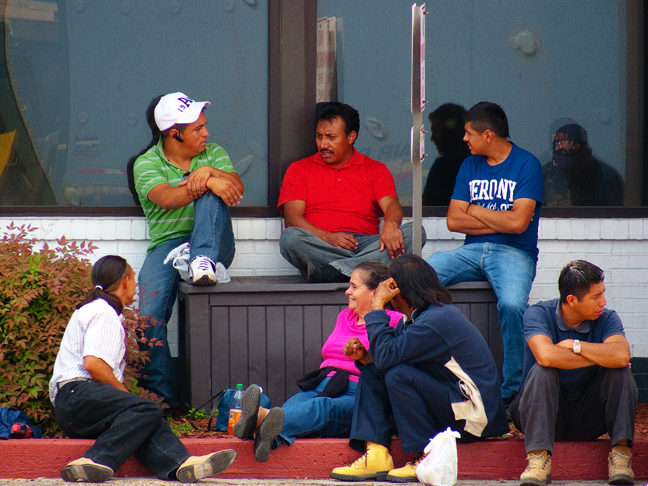
The official policy of the United States is and always has been to welcome both visitors and immigrants, as well as most asylum seekers, just as long as they properly register their presence and gain official status. Most foreigners do adhere to the law and are, in fact, here legally. But there are also a great many who are not here legally. The vast majority of illegals are not subversives, spies, terrorists, or criminals. They are honest, earnest, often skilled individuals looking for work. And quite often, the work they find is work American citizens are not willing to do, at least not for the wages offered. Faced with objections by law and order hard-liners the question becomes: should U.S. authorities, as a matter of principle, be compelled to hunt every one of those illegals down, pile them into a bus, and send them back to the country from which they came? But, if the answer is yes, exactly what would we accomplish by doing so? Proponents of such a policy claim we'd be "teaching potential illegals a lesson", perhaps suggesting "they better not try it or next time it'll be the death penalty". But in doing so, would we actually deter illegals? Or would we just be raising the price they pay for seeking a life that is better than the one they already have? In reality, for many, the quickness of a threatened death penalty might be a welcome alternative to the slow tortured death they face staying put. Conditions many illegals face in their homeland range from endless draught to food shortages to victimization from gangs to oppression, exploitation, and even political and ethnic extermination by corrupt governmental agencies. What the U.S. offers is hope of safe haven, peace, abundance, security, a chance to make things better. We'd have to do a whole lot more than threaten deportation, or even the death penalty, to squelch that kind of dream, that desperate desire for something better. In fact, we'd have to remake our society into something we wouldn't want to live in ourselves. Yet, maybe that's what proponents of such a policy actually want, for the U.S. to become a Fascist Police State wherein each verified, tagged, monitored individual could be relegated to a strict list of do's and do not's, a specific job for a specific set of credits, to be used for a specific set of government approved products produced by a specified list of government approved companies. That is, until one's usefulness runs out and one gets shunted off to a retirement village for a specified period of time prior to mandatory liquidation. Such a grand plan, by some perverse logic, could produce a state that assures all citizens receive a precisely measured portion of fairness while the corporate state achieves a certain brand of precisely regulated unending sustainability. At the same time, well-heeled elite, willing to finance both the activities of the state and the flow of credits to citizens, could look forward to a perpetual stream of boundless profits. And very likely, if such a plan were implemented, almost no one in their right mind would seek emigration to the U.S., legal or otherwise. But, is that the kind of society we want to live in? So then, what is the answer?. Build a higher fence? Or a moat, as Obama facetiously suggests? Shoot them at the border? Bomb their countries of origin? The fact is, we in the U.S. need immigrants. We need their skills and willingness to work for less, to do jobs we don't want to do. We need their tax money and Social Security and Medicare contributions to help pay for roads and schools, healthcare and our retirements, our time out on the farm before dying. We need their energies and creativity and industriousness to reinvigorate our economy, to help create jobs for both their children and our own. And we need their ideas and collaboration on how to build more fairness and opportunity into our ever more complicated system of self-governance. One idea for stemming the tide of immigration that has been tried, and in some cases actually worked, is development, development of immigrants' countries of origin. While we could try to make our country seem less desirable, we could also try to help make their countries into places they wouldn't want to leave. Within the southern hemisphere, Brazil in particular is booming. You just don't see immigrants from Brazil working in U.S. lettuce fields. Brazilians may be bent on destruction of their forests, but they aren't emigrating to the U.S. The saddest part is that none of these thoughts are likely to sway anyone's thinking on issues of immigration. As previously noted several times within this blog, "us vs. them" is a mode of thought deeply engrained in all of us. We huddle together in small groups for safety and comfort and, looking outward, we regard all outsiders with deep fearful suspicion. How and when that tendency will ever change is definitely not clear. |
• Posted: May 12, 2011 15:31:02
• Comments Welcome
• Vote CoolPhotoblogs
• Purchase a Print
• Share
Saturday, April 2nd, 2011 Lafayette LA USA |